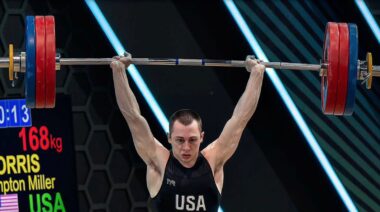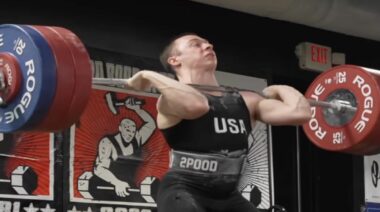1. Weightlifting Will Make You Fat
1. Weightlifting Will Make You Fat
While Vasily Alexeev did much to publicize weightlifting during his life he unfortunately also left the impression that you have to be big and fleshy around the middle in order to be successful.Weightlifting by itself does not make you fat. Too much or the wrong eating will make you fat. We have had parents keep their kids away from the gym because they think the end result will be a 55-inch waist. They think this even when seeing 56 and 63kg lifters who have lifted for years.
2. Being Fat Helps You to Lift Weights
People also believe in the corollary, i.e., that you should fatten up to lift the big ones. Only muscle can move your bones and hence move a weight. Fat does not help in any of this. What does happen is that for you to gain enough muscle to lift at world-class levels you will probably have to put up with a little bit of adipose tissue while you’re gaining that weight. Lifters are slightly fatter (men from 10 to 17% depending on weight category) than those in many other sports. This is because more muscle is needed to lift. And as you grow that muscle the body gets more inefficient at putting on extra bodyweight. A skinny person can put on weight with little added fat. Someone already quite muscular will have to put up with more fat as they grow.
As it is, it is only the super heavyweight categories of weightlifting that show an excess amount of fat. This does not concern them too much because there is no weight limit for them. As long as their mobility is not compromised, it is not much of a problem. That said, I certainly believe some super heavies have gone past the point of diminishing returns and should get themselves in a little better shape.
3. Weightlifting Makes You Slow
This is an old one going back to the dawn of time. I suppose it may have started with the gaslight era stage performers who were often big and ponderous. Surprise, weightlifters are not like that now – a century later. Watch any top lifter snatching, cleaning, or jerking, including a super heavyweight, and tell us they are slow.
4. Female Muscle Is Never as Strong as Male Muscle
This is not true. Fiber for fiber there is no strength difference between male and female muscle fibers. The problem is that women have fewer fibers. Men are indeed generally stronger than women. But there are a number of practical reasons for this. For starters, the average woman is five inches shorter than the average man and therefore much lighter, and in turn weaker, ceteris parabus. Second, female shoulder girdles are generally much narrower than men’s, making women proportionately weaker in the upper body.
These two facts alone will result in women being at a considerable disadvantage. Now we add to this body composition. Women have a higher percentage of their body weight as adipose tissue than men do in normal conditions. So even for two people of the same height and the same weight, the woman will probably have less muscle than the man due to sexual di-morphology. And finally, the lower testosterone of women will make the development of strength more difficult. But a muscle cell is still a muscle cell.
5. All Competitive Weightlifting is Powerlifting
The media and the general public seem to have picked up on this error in recent years and it’s hard to alleviate. Of course we in the weight sports ourselves don’t help. According to my old physics teacher “powerlifting” should apply to Olympic lifting because given their speed those lifts exhibit more power. Powerlifting in turn should be called “strength lifting” because that, and not power, is the main quality that athletes are testing. So maybe you can blame the media and the public. But it does irk the members of both sports when the rare occasion that any sort of weightlifting comes on television (usually in Olympic years) people talk about the “powerlifting” they watched on TV.
6. Weightlifting Does Not Make You as Strong as Honest Work Does
I think this one stems from our puritanical attitudes and perhaps nostalgia for what used to be, i.e. everybody doing a lot of manual labor. Modern Olympic weightlifting is a specialized sport. It requires specialized training. Pitching hay bundles, working a pick and shovel, and being a lumberjack, these are all activities that require high energy levels. But they do not help you become a good weightlifter. For one thing these activities are not progressive. All hay bundles are roughly the same size and you can only put so much hay on a fork. Get strong enough to do that and you’ll be fine. Since you can’t put anything more on the hayfork, you’re never going to get strong enough to lift double what you are lifting right now.
7. Weightlifting Is a Second-Class Activity
No matter how strong you are, even if you are a world or Olympic champion, you’re always asked, “Yes, but how how far can you throw a baseball?” or “But can you slam-dunk?” Who cares? These are different disciplines that exist on their own. Nobody asks a basketball player how much he can clean and jerk. And why should they?
8. Weightlifting Will Stunt Your Growth
I suppose this one came from looking at a lot of our lighter weight categories, where indeed the lifters are shorter than the mean. But, for goodness’ sake, lifting weights did not make these guys short! They were short to begin with. They chose weightlifting because it was a sport where the lack of height would be advantageous. Use the same reasoning, perhaps those short lifters could all play basketball instead to make them taller? When you put it that way you really get how dumb that statement is. Even reputable doctors are advising kids against lifting weights. All the many years I’ve been involved in weightlifting I’ve never seen anybody who could prove that lifting had stunted his or her growth.
9. Weightlifting Coaches Think Lifting Is a Substitute for Sport-Specific Skill
This myth comes not from the general public but from coaches and other sports that have added weight training to that sport’s preparation. And it usually comes from the coaches who have resisted this innovation. No weightlifting coach advocates that time in the weight room can be substituted for time practicing drills on the playing field. These anti-weightlifting, dinosaur coaches are always getting up on their hind legs talking about how weightlifting can’t help your football. While it is true lifting makes you stronger for football, it’s also true that’s all it’s supposed to do. Contrary to what these coaches imagine, nobody said weightlifting was going to be a substitute for running pass patterns. I think this is mainly a desperate attempt by retrograde coaches to somehow denigrate weight training, but it’s certainly not an intelligent one.
10. Women Weightlifters Are Not as Good as Their Male Counterparts
This one is an outgrowth of the general attitude of the public that women’s sports cannot be taken as seriously as men’s sports. Fortunately, inside the iron sports people realize that they are two different events with two different expectations. When the women’s 69kg lifters are competing, no one makes any remarks about how they are so far behind the men’s 69ers. They compare them to the best women 69ers and not to any men at all. If only the public would do the same.
Photos courtesy of Shutterstock.






